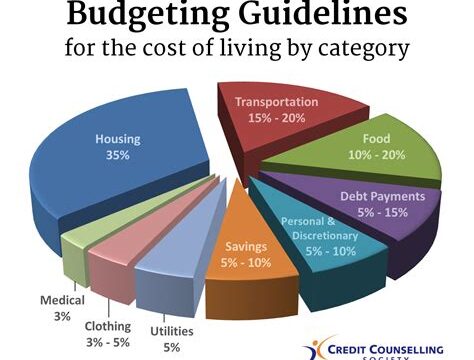Evaluate Your Current Housing Expenses
The cost of housing is a major expense for most individuals and families. It is important to regularly evaluate your current housing expenses to ensure that you are making the most financially responsible decisions. By taking the time to assess your housing costs, you can identify ways to potentially save money and make your living situation more affordable.
One of the first steps in evaluating your current housing expenses is to take stock of your monthly rent or mortgage payment. This is often the biggest portion of a person’s housing budget, so it is important to ensure that you are getting the most value for your money. Consider if your current housing situation aligns with your financial goals and long-term plans. If you are spending too much of your monthly income on housing, it may be time to explore alternative options.
Another aspect of evaluating your current housing expenses is to consider the additional costs associated with maintaining your home. This can include utilities, insurance, property taxes, and any necessary repairs or maintenance. These costs can quickly add up and can significantly impact your overall housing budget. Consider ways to reduce these expenses, such as implementing energy-efficient upgrades or shopping around for better rates on insurance or utilities.
- Regularly evaluate your current housing expenses
- Assess your monthly rent or mortgage payment
- Consider if your housing situation aligns with your financial goals
- Explore alternative housing options if necessary
- Take stock of additional costs like utilities, insurance, and maintenance
- Look for ways to reduce these expenses
| Expense Category | Current Cost | Potential Savings |
|---|---|---|
| Rent/Mortgage | $1,500 | $200 (downsize or negotiate lower rent) |
| Utilities | $200 | $50 (implement energy-efficient upgrades) |
| Insurance | $100 | $20 (shop around for better rates) |
| Maintenance/Repairs | $300 | $100 (learn basic DIY skills) |
By evaluating your current housing expenses, you can take control of your budget and potentially save a significant amount of money. It is important to regularly assess your housing costs to ensure that you are making the most financially responsible decisions. Whether it’s exploring alternative housing options, negotiating rent, or reducing energy and utility costs, there are various strategies to help you lower your housing expenses and free up more funds for other areas of your life.
Explore Alternative Housing Options
When it comes to housing expenses, many people are often looking for ways to reduce costs and explore alternative options. This can be especially beneficial if you are facing financial constraints or simply want to find a more affordable housing solution. In this blog post, we will discuss some alternative housing options that you can consider to lower your expenses and create a more budget-friendly living situation.
One alternative housing option that you may want to explore is downsizing. Downsizing involves moving to a smaller and more affordable home or apartment. By reducing the size of your living space, you can significantly lower your mortgage or rental payments. Additionally, downsizing also allows you to reduce your energy and utility costs. Smaller homes typically require less energy to heat, cool, and power, resulting in lower monthly bills.
Another alternative housing option to consider is having roommates. Sharing your living space with others can help to divide the expenses and reduce the financial burden. By splitting the rent or mortgage payments, utilities, and other housing-related costs with roommates, you can significantly lower your monthly expenses. This option is particularly popular among young adults and students who are looking to save money while living in a desirable location.
- Downsizing
- Having roommates
- Renting a shared space
- Living in a tiny house
- Participating in house swapping
| Alternative Housing Option | Benefits | Considerations |
|---|---|---|
| Downsizing | – Reduces mortgage/rental payments- Lower energy and utility costs | – Requires decluttering and organizing- Potential space limitations |
| Having roommates | – Divides housing expenses- Provides companionship | – Need to find compatible roommates- Shared responsibilities and compromise |
| Renting a shared space | – Lower rental costs- Shared amenities | – Limited privacy- Potential conflicts with other tenants |
| Living in a tiny house | – Minimalist lifestyle- Lower construction and maintenance costs | – Limited space and storage- Need for zoning regulation compliance |
| Participating in house swapping | – Allows for cost-free accommodations- Opportunity to explore new locations | – Requires finding suitable swap partners- Limited availability and flexibility |
In addition to downsizing and having roommates, there are several other alternative housing options to consider. Renting a shared space, such as a room or an apartment within a larger property, can be a more cost-effective option compared to renting an entire unit. Living in a tiny house, which is a small and compact dwelling, has gained popularity due to its affordability and simplicity. Another unique option is participating in house swapping, where you exchange homes with someone from another location, allowing both parties to enjoy cost-free accommodations.
As you explore alternative housing options, it’s important to weigh the benefits and considerations of each choice. While these options can help lower your housing expenses, there may also be certain limitations or challenges to overcome. Finding compatible roommates, dealing with limited privacy, and complying with zoning regulations are some factors to consider when opting for alternative housing. Additionally, it’s crucial to assess your personal preferences and lifestyle to ensure that the chosen alternative suits your needs.
Consider Downsizing or Roommates
Consider Downsizing or Roommates
When it comes to managing housing expenses, one option to consider is downsizing or finding roommates. These choices can help reduce the financial burden of renting or owning a home. Downsizing involves moving to a smaller, more affordable living space, while finding roommates allows for splitting the rent or mortgage payments with others.
By downsizing, you can significantly cut down on your housing expenses. Moving to a smaller house or apartment means paying less in rent or mortgage, as well as reducing utility costs. Additionally, downsizing often leads to a decrease in other related expenses like home maintenance, repairs, and insurance. It may require some adjustments in terms of space and belongings, but it can be a smart financial decision.
Alternatively, if downsizing is not an option or doesn’t suit your preferences, finding roommates can be a practical solution. Splitting the rent or mortgage with others can significantly reduce your monthly housing expenses. However, before making this choice, it is important to carefully select compatible roommates and establish clear communication and agreements regarding financial responsibilities and household rules.
Benefits of downsizing or having roommates:
- Reduced living costs
- Shared financial responsibilities
- Opportunity to save and invest
- Potential for building lasting friendships
Considerations when downsizing or finding roommates:
| Consideration | Explanation |
|---|---|
| Personal space | Ensure the new living arrangements meet your personal comfort |
| Compatibility | Find roommates who share similar lifestyles and habits |
| Financial agreements | Establish clear agreements on rent, utilities, and other expenses |
| Communication | Maintain open and honest communication with your roommates |
Whether you choose to downsize or have roommates, it is important to carefully evaluate your options and weigh the pros and cons. Consider your personal preferences, financial goals, and lifestyle factors before making a decision. By taking a proactive approach to managing your housing expenses, you can free up funds for other important areas of your life.
Negotiate Rent or Mortgage Payments
One of the most effective ways to lower your housing expenses is to negotiate your rent or mortgage payments. Whether you’re a renter or a homeowner, this strategy can potentially save you a significant amount of money each month. Negotiating your rent or mortgage payments may seem intimidating at first, but with the right approach and some research, you can successfully negotiate a better deal. Here are a few tips to help you get started:
1. Research Comparable Listings
To negotiate effectively, it’s important to know the market value of similar rental properties in your area. Research online listings and compare the prices of similar properties to get an idea of what a fair price would be. With this information, you’ll be better equipped to negotiate for a lower rent.
2. Highlight Your Good Rental History or Credit Score
If you have a good rental history or a high credit score, be sure to emphasize these positive aspects when negotiating. Landlords or mortgage lenders may be more willing to negotiate with tenants or homeowners who have demonstrated responsible financial behavior.
3. Be Prepared to Compromise
When negotiating, it’s important to be flexible and open to compromise. You may not be able to secure the exact terms you want, but by being willing to negotiate and find middle ground, you can achieve a more affordable payment plan. Consider asking for a longer lease term or offering to pay a larger deposit in exchange for a reduced rent.
4. Hire a Professional Negotiator
If negotiating isn’t your strong suit, you can also consider hiring a professional negotiator to represent you. Real estate agents or financial advisors who specialize in negotiation can use their expertise to help you secure a better deal on your rent or mortgage.
By negotiating your rent or mortgage payments, you can potentially save a significant amount of money each month. Remember to approach the negotiation process with confidence and be prepared to make compromises. With a little research and the right strategy, you can successfully lower your housing expenses and improve your financial well-being.
Reduce Energy and Utility Costs
When it comes to managing expenses, one area that often takes a big chunk of our budget is energy and utility costs. From electricity and water bills to heating and cooling expenses, these expenses can quickly add up if not properly managed. In this blog post, we will explore some effective ways to reduce energy and utility costs.
1. Conduct an energy audit: Start by evaluating your current energy usage habits. Identify areas where you can make changes to reduce consumption. For example, you can switch to LED bulbs, install programmable thermostats, or insulate your windows and doors to prevent drafts.
2. Unplug and use power strips: Many electrical appliances and devices continue to draw power even when not in use. Unplug them or use power strips that can be easily switched off when not needed. This simple habit can help you save on standby power consumption.
3. Optimize heating and cooling: Set your thermostat at an energy-efficient temperature. Lower the temperature during winter and raise it during summer when you are away. Also, consider using fans and natural ventilation instead of relying solely on air conditioning. Proper insulation and sealing can also help retain heat or cool air.
4. Use energy-efficient appliances: When it’s time to replace old appliances, opt for energy-efficient models. Look for the Energy Star label, which indicates that the appliance meets strict energy efficiency guidelines. These appliances may have a higher upfront cost but will save you money in the long run through lower energy consumption.
5. Conserve water: Reduce your water consumption by fixing any leaks in taps or pipes promptly. Install water-efficient fixtures, such as low-flow showerheads and faucets. Additionally, consider using water-saving practices like taking shorter showers and watering your garden during cooler hours.
| Energy-Saving Tip | Impact |
|---|---|
| Switching to LED bulbs | Reduces energy usage and saves money on electricity bills |
| Using power strips | Prevents standby power consumption |
| Optimizing heating and cooling | Reduces energy usage and saves money on heating and cooling expenses |
| Using energy-efficient appliances | Lowers energy consumption and reduces electricity bills |
| Conserving water | Reduces water consumption and saves money on water bills |
By implementing these strategies and being mindful of your energy and utility usage, you can make a significant impact on lowering your overall housing expenses. Additionally, remember to regularly review your energy and utility providers to ensure you are getting the best deals and rates available. With a little effort and awareness, you can successfully reduce your energy and utility costs while still enjoying a comfortable living environment.
Cut Back on Home Maintenance and Repairs
When it comes to managing our housing expenses, one area where we often overlook potential savings is in home maintenance and repairs. While it might seem counterintuitive, investing in regular maintenance and addressing repairs when they arise can actually help us cut back on costs in the long run. By taking a proactive approach and being mindful of our spending, we can ensure that our homes are well-maintained without breaking the bank.
One effective way to reduce home maintenance and repair costs is to prioritize preventative measures. By regularly inspecting our homes and addressing any issues before they become major problems, we can avoid costly repairs down the line. This might include tasks such as cleaning gutters, sealing cracks, or replacing worn-out components. By being proactive, we can catch small issues early on and prevent them from snowballing into larger, more expensive repairs.
Another way to cut back on home maintenance and repair expenses is to consider DIY (do-it-yourself) options whenever possible. While it’s important to know our limits and when to hire professionals, there are many tasks that we can handle ourselves with a little research and preparation. Whether it’s fixing a leaky faucet, painting a room, or replacing a light fixture, learning basic DIY skills can save us money on labor costs. However, it’s crucial to weigh the cost savings against our own abilities and the complexity of the task at hand.
In addition to preventative measures and DIY options, it’s also wise to be resourceful and shop smart for materials and supplies. Comparison shopping and researching different brands or suppliers can help us find the best deals and avoid overpaying for items. Additionally, considering pre-owned or refurbished materials can also provide significant savings without compromising quality. By being strategic in our purchasing decisions, we can cut back on expenses without sacrificing the integrity of our homes.
To summarize, cutting back on home maintenance and repairs is a practical way to lower our housing expenses. By prioritizing preventative measures, considering DIY options, and being resourceful in our purchasing decisions, we can reduce costs without sacrificing the condition of our homes. So, let’s take a proactive approach, embrace our DIY spirit, and shop smart to achieve a more affordable and well-maintained living space.
Shop Smart for Household Essentials
When it comes to managing our household expenses, one area where we can easily find ways to save money is by shopping smart for household essentials. From cleaning supplies to groceries, there are several strategies that can help us stick to our budget without compromising on quality. By making a few simple changes in our shopping habits, we can ensure that we are getting the best deals and maximizing our savings.
One of the first things to consider when shopping for household essentials is to make a list before heading to the store. This will help us stay focused and avoid impulse purchases. By knowing exactly what we need, we can also compare prices and look for any discounts or promotions that are available. It’s always a good idea to check the weekly flyers or browse online to see if there are any special deals on the items we need.
Another important tip is to buy in bulk whenever possible. Purchasing household essentials in larger quantities can often result in significant savings. Items such as toilet paper, laundry detergent, and paper towels have a long shelf life, so stocking up on these items can help us save money in the long run. However, it’s important to be realistic about our needs and storage space. Buying in bulk only makes sense if we can use the items before they expire or go bad.
- Make a shopping list before heading to the store.
- Compare prices and look for discounts or promotions.
- Consider buying household essentials in bulk to save money.
- Check for coupons and use loyalty programs to maximize savings.
- Consider alternative brands or generic options to save money without sacrificing quality.
Furthermore, it’s important to take advantage of coupons and loyalty programs. Many stores offer digital or paper coupons that can be used to save money on household essentials. It’s worth taking the time to search for coupons online or in newspapers before making a purchase. Additionally, signing up for loyalty programs can often result in extra discounts or rewards points that can be redeemed for future purchases.
Lastly, don’t be afraid to consider alternative brands or generic options. While we may have our preferred brands for certain household essentials, it’s worth exploring other options to see if we can find a more affordable alternative. Generic products often offer similar quality at a lower price point. By being open to trying different brands, we can potentially save a significant amount of money over time.
| Tip | Description |
|---|---|
| Make a shopping list | Stay focused and avoid impulse purchases |
| Buy in bulk | Save money on items with a long shelf life |
| Utilize coupons and loyalty programs | Take advantage of discounts and rewards |
| Consider alternative brands | Explore more affordable options without sacrificing quality |
In conclusion, shopping smart for household essentials is an effective way to reduce expenses without compromising on the quality of the products we use. By making a shopping list, comparing prices, buying in bulk, utilizing coupons and loyalty programs, as well as considering alternative brands, we can make significant savings over time. With a little bit of planning and smart decision-making, we can ensure that our household essentials don’t break the bank.
Utilize Technology to Lower Housing Expenses
Technology has become an integral part of our lives, revolutionizing the way we live, work, and even manage our finances. We are constantly looking for ways to save money and reduce expenses. One area where technology can play a significant role in lowering costs is housing expenses. By harnessing the power of technology, we can find innovative solutions to cut back on our housing costs and make our lives more affordable.
One way to utilize technology to lower housing expenses is by using smart home devices. These devices can help you save money on utilities like electricity and water. For example, smart thermostats allow you to control the temperature of your home remotely, so you can adjust it to a lower setting when you’re not at home. This can result in substantial savings on your monthly energy bills. Similarly, smart water meters can help you track and reduce your water usage, saving you money on your water bill.
In addition to smart home devices, there are also various apps and online platforms that can help you find affordable housing options. These platforms not only allow you to search for rental properties, but also provide you with valuable information on the average rental prices in different areas. By using these tools, you can compare prices, negotiate better rental terms, and ultimately find a more affordable place to live.
Furthermore, technology can also assist you in reducing your home maintenance and repair costs. There are numerous online platforms that connect homeowners with experienced and vetted service providers at competitive prices. By using these platforms, you can easily find trustworthy contractors for home repairs and maintenance tasks, eliminating the need for expensive middlemen or unreliable providers. Additionally, you can also find online tutorials and resources that can help you tackle small repairs or DIY projects, saving you even more money.
Frequently Asked Questions
How can I evaluate my current housing expenses?
To evaluate your current housing expenses, make a list of all the costs associated with your housing, including rent or mortgage payments, utilities, insurance, maintenance, and repairs. Calculate the total amount you spend each month or year to get an idea of your current expenses.
What are some alternative housing options I can consider?
Some alternative housing options you can consider include downsizing to a smaller and more affordable home, renting a room or apartment instead of renting a whole house, or exploring co-living spaces or shared housing options.
How can downsizing or having roommates help reduce housing expenses?
Downsizing to a smaller home can reduce your housing expenses by decreasing your mortgage or rent payments, as well as reducing your utility and maintenance costs. Having roommates can also help by splitting the rent and other expenses, making it more affordable for everyone.
Is it possible to negotiate rent or mortgage payments?
Yes, it is possible to negotiate rent or mortgage payments. You can try negotiating with your landlord or mortgage lender to lower your monthly payments. It may be helpful to provide evidence of your financial situation and explain why a reduction would be beneficial for both parties.
How can I reduce energy and utility costs?
To reduce energy and utility costs, you can practice energy-saving habits such as turning off lights and appliances when not in use, using energy-efficient light bulbs, adjusting thermostat settings, insulating your home, and using programmable thermostats. You can also compare utility providers to find the most affordable options.
What are some ways to cut back on home maintenance and repairs?
You can cut back on home maintenance and repairs by taking preventative measures such as regular cleaning and maintenance tasks to avoid potential issues. Additionally, you can learn basic DIY skills to handle minor repairs yourself instead of hiring professionals, which can save money in the long run.
How can I shop smart for household essentials?
To shop smart for household essentials, you can compare prices at different stores, take advantage of sales and discounts, use coupons or loyalty programs, buy in bulk for frequently used items, and consider purchasing generic or store brand products instead of branded ones.
How can technology help lower housing expenses?
Technology can help lower housing expenses in various ways. You can use smart home devices and apps to control and track energy usage, which can lead to energy savings. Online platforms and apps can also help you find affordable housing options, budgeting tools, and resources for negotiating rent or mortgage payments.





